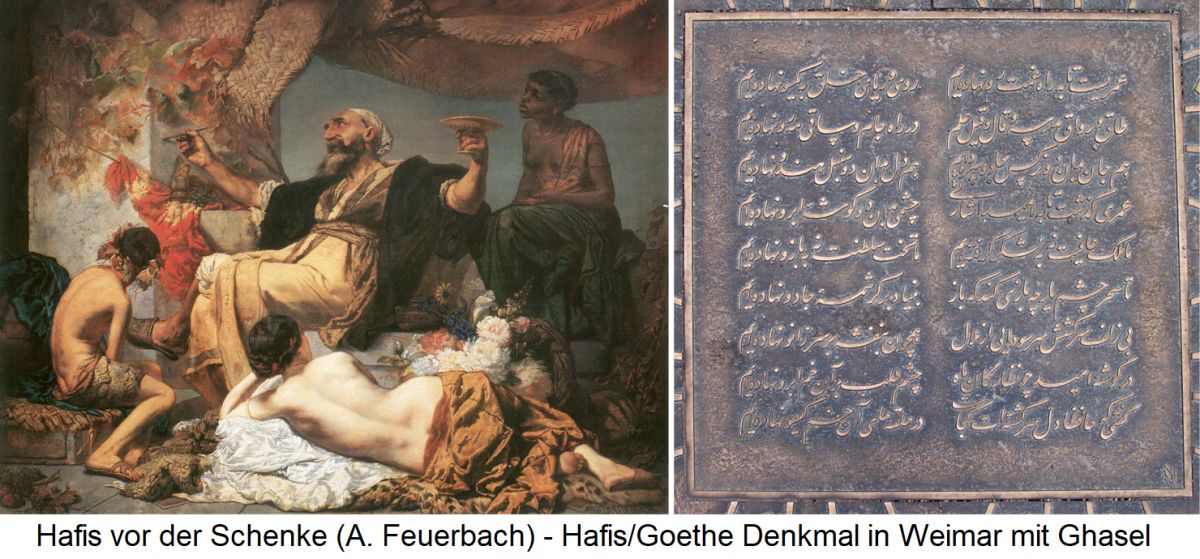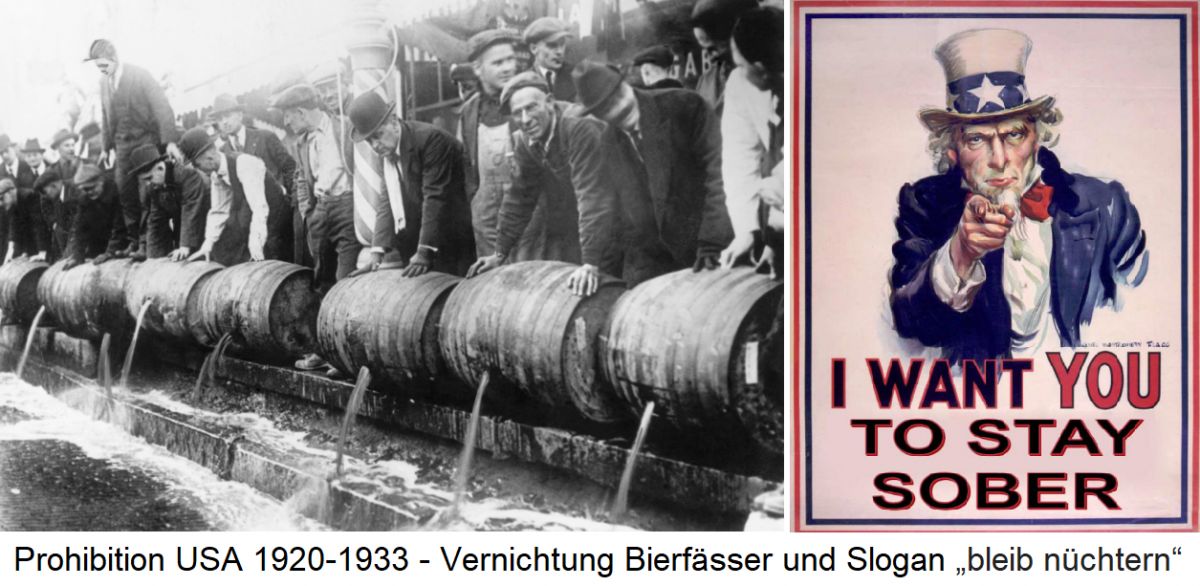In Islam, drinking alcohol is a capital offence along with adultery, fornication, slander, grand larceny and murder, and this may even apply to taking medicines dissolved in alcohol substances. Among the 20 greatest sins in Islam, the consumption of alcohol ranks thirteenth. The prohibition for devout Muslims is inextricably linked to Mohammed (570-632), the founder of Islam. Wine or alcoholic beverages were thus banned forever from almost all countries that adopted the new religion. Drinking wine (shurb al-chamr) is one of the hadd punishments in Islamic criminal law. These are punishments imposed to protect property, public safety and public morals and are considered "legal claims of God". Depending on the school of law, alcohol consumption can be punished with 40 to 80 lashes or, as in Iran, even death in case of repetition.

However, the ban only became established over time, because wine was certainly appreciated in individual Arab countries in the early Islamic era. The Persian city of Shiraz was considered the centre of the highest wine culture until the 19th century, and poets like the famous Hafis (1324-1388) sang the praises of wine. The picture on the right shows one of Hafis' poems (Ghasel) on the Goethe-Hafis monument in Weimar. Trading in wine was at times allowed to Jews and Christians (not Muslims) by individual caliphs because it brought in tax revenue. The ban was then reinforced by the rise of Islamic fundamentalism in the 20th century. After Ayatollah Khomeini's followers seized power in Iran in 1979, all alcohol that had previously been on sale in shops was emptied onto the streets of Tehran.
Origin of the alcohol ban in Islam
But what is the reason for the ban and how is it justified in the Koran, to which the legal scholars of Islam refer? The Koran explicitly names the vines as God's creation, as it says in Sura 16, verse 11: "It is He Who causes water to come down from the clouds. With it He makes the grain grow, and the olive trees, date palms and vines". The Islamic paradise is described as a garden watered by wells and clear streams with many fruits. The orthodox rest on divans and are cared for by beautiful black-eyed huris (dazzling whites) who serve them ginger-spiced wine mixed with the water of the Tasnim spring from full musk-sealed hoses. In Sura 47, verse 16, the believers are promised "rivers of water, milk, wine and honey" . Qur'anic commentators, however, emphasise that the wine of Paradise will not intoxicate.
It is often debated what the Prophet meant by the prohibition of alcohol and whether there are not exceptions. Mohammed also enjoyed nabidh, a drink made from dates. After all, he grew up in a culture where wine and other alcoholic drinks made from wheat, barley, millet and honey were valued as a gift from God in the "time of ignorance" (i.e. before Islam). Wine taverns were popular places to go and indulge in good luck. Wine was part of everyday life, which is often documented in the Bible. Aisha (Ayesha), Muhammad's favourite wife, recounted: " We used to prepare nabidh (date wine) by putting a handful of dates or sultanas in a hose and pouring water on it. This was then enjoyed by him in the evening if we prepared it in the morning or in the morning if we did it in the evening." After this short fermentation period, however, the drink was still hardly alcoholic, i.e. not intoxicating.
Different interpretations
So was the prohibition of alcohol not to be understood so strictly after all? Perhaps only wine made from grapes (but not wine made from dates) was prohibited, or perhaps even only the excessive consumption of alcohol, i.e. intoxication (drunkenness)? This was justified by liberal representatives with the following Koranic verse: "Those who hold fast to faith and do good shall not be blamed for any food they may have enjoyed, as long as they believe in Allah and do good" . This was also the view (after Muhammad's death) of his widow Aishah: "You may drink, but do not get drunk". Most Islamic legal scholars, however, consider these discussions to be sophistry and hair-splitting and believe that all drinks that can intoxicate are forbidden for a Muslim on principle and therefore different interpretations are not possible.
The Koran (Arabic Kur-ân), the Bible of Islam, so to speak, is of the highest poetry and wisdom. Johann Wolfgang von Goethe (1749-1832) also recognised this and wrote: "The Qur'ân attracts us again and again, fills us with admiration and finally compels us to worship it". This work, written in rhyming prose in Arabic, was composed around 610 to 632 and represents the revelations communicated to the Prophet by Allah and binding on all believers (Muslims). Originally, the Qur'an was written without the intention of a collected written record, but only for memory and rote repetition, and was compared annually by Muhammad and the angel Gabriel with the original text in heaven. It was written gradually over the course of 23 years and consists of 114 chapters, the Suras (Sura = the sublimity overwhelming man) with a total of 6666 verses.
The suras were only collected after Muhammad's death on the order of Abu Bekr (father of Aisha and later the first caliph). Four suras deal with wine (Khamr in Arabic). Sura 16 "Al-Nahl" (The Bees) in verse 68 states quite positively: "And from the fruit of the palm trees and the grapes you receive intoxicating drinks and also good food". Sura two "Al-Bakarah" (The Cow), however, gives the cautionary advice in verse 220: "They will also question you about wine and gambling (meaning the arrow game Meisar, which involved a camel). Tell them that in both there is danger of sin, but also benefit for the people; but the disadvantage outweighs the benefit". And similarly, Surah four "Al-Nisa" (The Women) warns in verse 44 as follows: "O believers, do not pray in drunkenness, but only until you know again what you are saying".
However, these statements in the two suras are not yet understood as a complete ban on wine even by Islamic legal scholars. The passage in the Koran on which the prohibition of alcohol and wine is based was written after an incident in Medina. After a meal and drinking session, one of Muhammad's followers from Mecca began to recite mock verses about the people of Medina while under the influence of alcohol, whereupon a follower from Medina hit him over the head with a bone (he was not dead, but had a gaping head wound). Muhammad asked Allah how he could keep order among his disciples. Allah's answer can be found in the fifth sura "Al-Maida" (The Table) in verse 92.
This is also significant because, according to research, this sura was one of the last to be written (and can therefore be considered "final"): O believers, wine, gambling, images and casting lots (a popular game of chance) are detestable and a work of Satan. Avoid them, that it may be well with you. Satan only wants to cast enmity and hatred between you through wine and gambling, and to turn you away from the thought of Allah and from prayer. Will ye not therefore desist therefrom? Obey Allah and obey the messengers and be on your guard. Here, too, the word "forbidden" (Arabic haram) does not appear, but the general view has slowly become established in Islam that wine and, in addition, everything intoxicating (i.e. including drugs) are forbidden.
Punishments for alcohol consumption
This response prompted Mohammed to order all wine in Medina to be poured out on the streets. However, it was not only the argument that was decisive, but he also referred to the effects that heavy wine had on the people of the desert with their innately hot temper. Muhammad decreed an absolute ban on wine and set a penalty of 40 lashes for the transgression. A successor even increased this to 80, which, depending on the intensity, could lead to death. However, this punishment was rarely applied. In the early days of Islam, however, many questions remained unanswered, not only regarding alcohol consumption, which could not always be clearly interpreted from the Koran. After Muhammad's death, therefore, two writings came into being which, together with the Qur'an, are considered to determine the faith and the law.
The first is the Hadith (narration) with reports of Mohammed's sayings and deeds, and the second is the Sunna (custom) with reports of Mohammed's exemplary behaviour. In it, it is narrated that the angel Gabriel offered Muhammad two drinking vessels during his celestial journey, one containing milk and the other alcohol. Muhammad chose the milk and Gabriel said, "If you had taken the alcohol, your congregation would have gone astray." According to Mohammed, on the Day of Resurrection, the alcohol drinker will be counted among the unbelievers. The Iranian theologian Al-Ghazali (1059-1111) emphasised that no one should marry his daughter to a wine drinker and thereby expose himself to the wrath of God.
Prohibition of alcohol in Islam today
However, a strict ban on alcohol never really became established in the Islamic world. Especially in the Ottoman Empire (1299 to 1922), phases of rigorous interpretation alternated with pragmatic views. The writer Ahmed Rasim (1826-1897) wrote that Istanbul's urban youth only adhered to the ban on alcohol during the months of Ramadan and Muharram. They often distinguished between the "pleasure drinker" and the "habitual drinker" and were concerned with the "right measure", i.e. the acceptable daily amount. Only in a few Islamic countries is there a rigorous ban today, so that alcoholic beverages can only be acquired illegally. These are Iran, Kuwait, Mauritania, Saudi Arabia and Sudan. On the other hand, wine is produced and consumed in Egypt, Algeria, Jordan, Lebanon, Morocco, Tunisia and Turkey, among others. However, a ban on alcohol is not limited to Islam, but has also existed and continues to exist in the occidental cultural sphere. The best-known example is Prohibition in the USA, which was in force from 1920 to 1933.

Further information
See also alcoholism, health, prohibition and drinking culture, as well as lists of relevant keywords under the headings alcoholic beverages and alcohol consumption.
Voices of our members

The Wine lexicon helps me to keep up to date and refresh my knowledge. Thank you for this Lexicon that will never end in terms of topicality! That's what makes it so exciting to come back often.
Thorsten Rahn
Restaurantleiter, Sommelier, Weindozent und Autor; Dresden